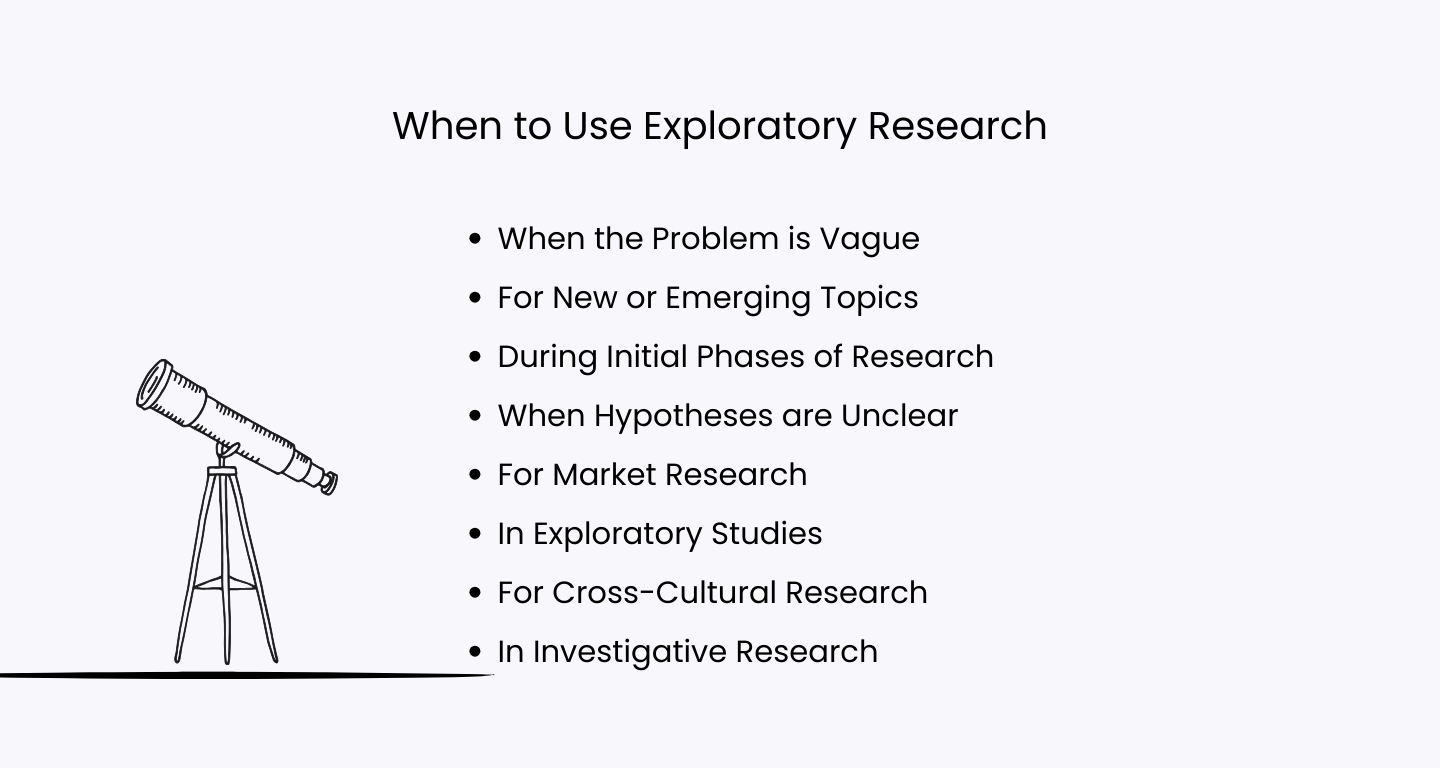Exploratory Research: Your Guide to Unraveling Insights

Kate Williams
Last Updated: 29 May 2024
11 min read

Did you know that exploratory research has played a pivotal role in some of the most significant scientific discoveries of our time? From figuring out why people do what they do to understanding what sells in the market, exploratory research shows us the way to discover new things. In this blog, we will look into the core concepts, their importance, and examples to help you get a clear idea.
What is Research?
Now, before we go into the details, let’s look at the basics. (Hey, novice researchers out there, we’ve got you covered!)
Research is a systematic investigation into materials, sources, or subjects to establish facts and reach new conclusions. It is a tool for curious minds. Scientists and scholars use it to uncover new knowledge, validate existing theories, or solve real-world problems.
Types of Research
There are different types, each with a distinct purpose. Basic research aims to explore fundamental principles and expand theoretical knowledge, while applied research focuses on applying these principles to practical situations and finding solutions to real-world challenges. Both types of research are essential and work together to advance scientific understanding and improve our lives.
Methods and Techniques
Researchers employ different methods to gather data. Quantitative research deals with numerical data often analyzed statistically. It’s ideal for answering “how many” or “how much” questions. Qualitative research, on the other hand, explores the depth of human experiences and motivations. Through methods like interviews or focus groups, researchers gain insights into attitudes, behaviors, and emotions.
What is Exploratory Research?
It’s a preliminary research method that ventures into uncharted territories. In simpler terms, exploratory research is the initial step researchers take when they want to investigate something new, ambiguous, or not well understood. It’s like dipping your toes in the water to test its temperature before diving in. This type of research is more about exploring questions than answering them definitively.
Think of your favorite local café. To enhance the customer experience, the owner is investigating the preferences of regular patrons by engaging in casual conversations to explore their preferences for coffee and pastries. This informal approach to inquiry is similar to exploratory research in the field of data and insights. It aims to gather information through an open-ended exploration of different tastes and preferences.

So, when do researchers use it? Exploratory research is employed when they meet with a vague problem or when previous studies are insufficient. This type of research plays a crucial role in refining research questions and hypotheses for more focused studies in the future.
Research methods include literature reviews, interviews, focus groups, and case studies. These methods allow researchers to gather diverse perspectives and insights, providing a holistic view of the subject under investigation. We’ll look into the methodologies in detail now.
And, today everything is so much easier. We have advanced tools to streamline the research process. For instance, with SurveySparrow, you can create engaging surveys, collate data, analyze, and act upon the insights you gain from them. Yes, all this can be done on a single platform!
14-day free trial • Cancel Anytime • No Credit Card Required • No Strings Attached
Types of Exploratory Research-Methodologies
Exploratory research uses a lot of methodologies to get a unique perspective on the research problem. Let’s take a look at them:
1. Literature Reviews
This involves analyzing already existing information and bringing new interpretations. It can be analyzing existing research, articles, and scholarly works related to the research question. It’s like reading through numerous books to gather insights, understand the historical context, and identify gaps in knowledge. Before that, you should have a clear idea of how to write a good literature review. Plus, it helps us understand underlying patterns, common themes, theories, and gaps in existing knowledge.
2. Interviews
Think of interviews as having a one-on-one conversation with an expert. You can converse in-depth with experts, stakeholders, or individuals relevant to the research topic. Researchers engage with individuals who possess valuable insights or experiences related to the research topic. These discussions provide qualitative data, allowing researchers to dig deep into the subject and gain nuanced perspectives. Here, by asking open-ended questions, valuable qualitative data can be derived.
3. Focus Groups
Focus groups involve gathering a small, diverse set of participants to discuss a research topic. Researchers collect opinions, attitudes, and ideas through guided discussions, fostering interactive dialogue and uncovering subtle nuances. Basically, its success might depend on the skill of the moderator to talk through the situation and arrive at a specific point or topic. Once the code is cracked, subtle nuances such as social norms, cultural influences, and group consensus can be uncovered.
4. Case Studies
Case studies are like detailed character profiles. Researchers explore real-life cases or situations and gain insights into complex phenomena. Case studies offer a comprehensive understanding of a subject through qualitative data, including interviews, observations, and documents.
5. Surveys
Surveys help us gather opinions from a large audience. But how do they do that? By designing structured questionnaires to collect data from a broad sample group. Moreover, surveys are scalable. This means they provide quantitative data, enabling researchers to identify trends, preferences, and patterns within the responses. The responses, when statistically analyzed, reveal trends, correlations, and statistical significance among variables.
6. Observational Research
This happens in real-life settings, allowing researchers to observe participants’ behavior, interactions, and reactions unobtrusively. Imagine quietly observing people in a bustling market. Observational research involves watching and recording participants’ behavior in natural settings. It provides researchers with firsthand insights, uncovering unscripted behaviors and interactions.
When to Use Exploratory Research
It is particularly useful when you have no idea what is to come, or what you need to do! When the path forward isn’t clear researchers need to gain a deeper understanding. Here are some situations where exploratory research shines:

1. When the Problem is Vague
It is ideal when the research problem is ambiguous or not well-defined. Researchers can use exploratory methods to explore the problem from various angles and gain clarity before diving into focused studies. so, if you’re not entirely sure what you’re looking for, it can help you figure your way out.
2. For New or Emerging Topics
It helps you discover the basics and get your bearings. When researchers delve into new or emerging fields where limited prior research exists, exploratory methods can lay the foundation. They help understand the basics, identify key variables, and formulate relevant research questions.
3. During Initial Phases of Research
It’s perfect for the beginning of your research journey. Before designing complex experiments or extensive surveys, researchers use exploratory methods to refine their approach, ensuring that subsequent studies are well-informed.
4. When Hypotheses are Unclear
If researchers have a broad research area but lack specific hypotheses, exploratory methods can help generate initial hypotheses. By exploring various aspects of the problem, researchers can narrow down their focus and formulate precise hypotheses for further testing.
5. For Market Research
Businesses often use exploratory research to understand market trends, consumer preferences, and emerging needs. Exploratory methods such as focus groups or surveys can provide valuable insights, guiding product development and marketing strategies.
6. In Exploratory Studies
Sometimes, researchers conduct exploratory studies to explore a specific phenomenon or social issue. These studies aim to provide insights and generate hypotheses, laying the groundwork for more extensive research projects.
7. For Cross-Cultural Research
Exploratory research is valuable when studying diverse cultural groups. Understanding the intricacies of different cultures, norms, and behaviors often requires initial exploratory studies to form a solid foundation for comparative analyses.
8. In Investigative Research
Exploratory methods are essential in investigative research, especially in fields like criminology or social sciences. Researchers gather preliminary data, explore various perspectives, and identify patterns before conducting in-depth investigations.
The Importance of Exploratory Research
Why does exploratory research matter? Imagine you’re an entrepreneur launching a new product. You have a vague idea about your target audience, but you’re not entirely sure what they need or want. This is where exploratory research steps in. It provides the insights you need to fine-tune your product, understand your audience, and tailor your marketing strategies effectively.
- Inspires Creativity: Sparks innovative ideas and out-of-the-box thinking.
- Guides the Journey: Helps refine research questions and provides a roadmap for further studies.
- Reveals Hidden Patterns: Uncovers overlooked trends and connections in initial data.
- Informs Methodology: Guides researchers on the best methods for in-depth studies.
- Foundation for In-Depth Studies: Shapes focused research by identifying variables and context.
- Adapts to Change: Helps businesses and researchers stay updated with evolving trends.
- Enhances Decision-Making: Provides valuable insights for informed choices in various fields.
Advantages and Disadvantages of Exploratory Research
Advantages:
- Uncovering Hidden Insights: Exploratory research helps reveal hidden patterns and trends.
- Flexible and Adaptive: It allows researchers to adapt their approaches based on emerging findings.
- In-depth Understanding: Offers a deep understanding of the research problem, paving the way for more focused studies.
Disadvantages:
- Limited Generalizability: Findings might not apply universally due to the specific nature of the study.
- Time-Consuming: Exploratory research can be time-intensive, especially when employing qualitative methods.
- Potential Bias: Depending on the methods used, there’s a risk of bias in the findings.
A Step-by-Step Guide to Conduct Exploratory Research
1. Define Your Research Problem
Clearly outline the problem you want to explore. Be specific about the aspects you find ambiguous or intriguing.
2. Conduct a Literature Review
Dive into existing research related to your topic. Identify gaps, trends, and common theories. This provides a foundation for your exploration.
3. Choose Your Exploratory Methods
Select methods like interviews, focus groups, or surveys. The choice depends on your research question and the depth of insights you seek.
4. Design Your Research Instruments
If you’re conducting interviews or surveys, craft open-ended questions. Encourage participants to share detailed responses, enabling richer data collection.
5. Recruit Participants
Find individuals or groups relevant to your research. Ensure diversity to capture a broad range of perspectives.
6. Gather Data
Data Collection is key! Conduct interviews, focus groups, or distribute surveys. Pay attention to participants’ responses, body language, and contextual details.
7. Analyze Qualitative Data
Transcribe interviews and categorize responses. Look for recurring themes, emotions, and perspectives. Qualitative data analysis software can aid in this process.
8. Identify Patterns and Insights
Uncover commonalities and differences in participants’ responses. Identify patterns, trends, and unique insights that emerge during your analysis.
9. Draw Tentative Conclusions
Based on your findings, draw preliminary conclusions. These will guide your future research or help refine your research questions.
10. Document Your Process
Keep detailed records of your methods, findings, and insights. Documenting your process ensures transparency and helps in the analysis phase.
11. Stay Open-Minded
Exploratory research is about discovery. Stay open to unexpected findings. Sometimes, the most valuable insights come from the unexpected.
12. Validate Your Findings
Discuss your findings with peers, mentors, or experts. Their perspectives can help validate your insights and refine your conclusions.
13. Refine Your Research Questions
Based on your exploratory findings, refine your research questions or hypotheses. This refinement sets the stage for further focused studies.
Conclusion
Exploratory research is all about curiosity and the thrill of uncovering the unexpected. Each question leads to a discovery. Despite its challenges, this approach is the heart of creative exploration and offers unique insights that shape the way we understand the world. So, whether you’re a researcher or simply curious, don’t shy away from the unknown. Dive in, ask questions, and let the excitement of discovery guide your journey!
And, while you’re at it, why not give SurveySparrow a try? It’s absolutely free!
14-day free trial • Cancel Anytime • No Credit Card Required • No Strings Attached

Kate Williams
Content Marketer at SurveySparrow
You Might Also Like

Turn every feedback into a growth opportunity
14-day free trial • Cancel Anytime • No Credit Card Required • Need a Demo?




